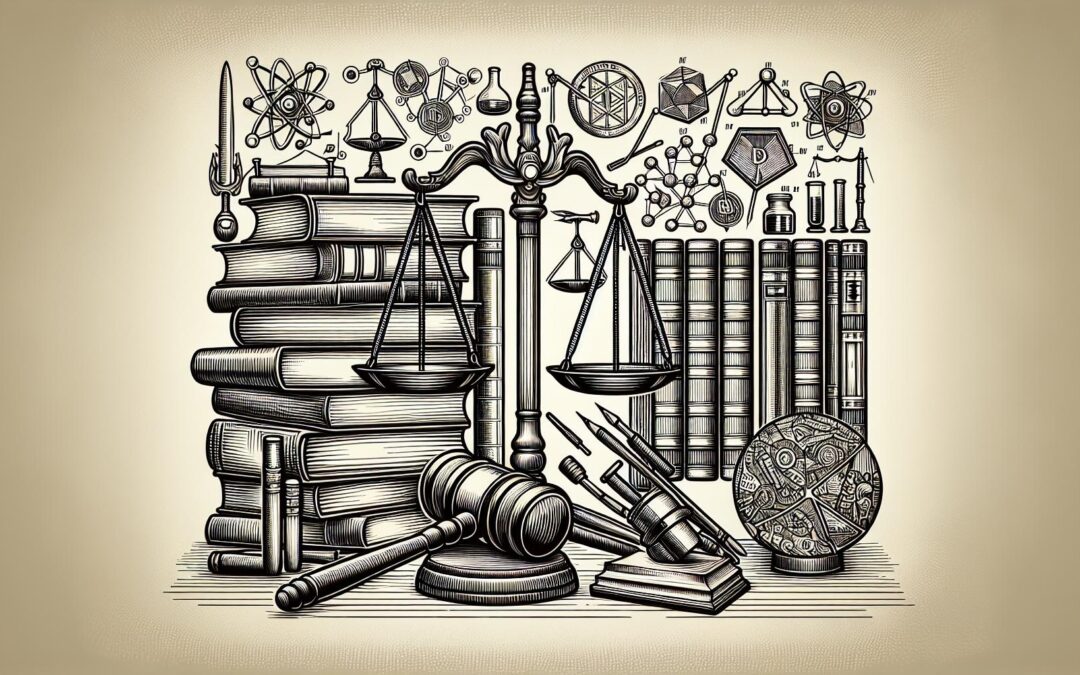In the realm of intellectual property, understanding the concept of KSA – Knowledge, Skills, and Abilities – is essential. KSA encompasses the expertise and competencies needed to effectively navigate the complex world of intellectual property. This article aims to shed light on the importance of KSA in the intellectual property landscape, delve into key terminology, explore the intersection of KSA and intellectual property, discuss ways to enhance KSA in this field, and present case studies that illustrate the impact of KSA on intellectual property management.
Understanding the Concept of KSA
Before delving into the intricacies of intellectual property, it is crucial to have a clear understanding of KSA. At its core, KSA refers to the combination of knowledge, skills, and abilities, which collectively equip individuals with the necessary capabilities to excel in a specific domain. In relation to intellectual property, KSA plays a pivotal role in comprehending the intricacies of patent, copyright, trademark, and trade secret law.
When it comes to intellectual property, the concept of KSA goes beyond a mere understanding of the subject matter. It involves a deep dive into the various aspects that make up the intellectual property landscape. From understanding the legal frameworks to staying updated with industry practices and emerging trends, individuals with strong KSA in intellectual property are better equipped to handle the challenges that come their way.
Defining Knowledge, Skills, and Abilities
Knowledge refers to the theoretical understanding of intellectual property principles, laws, and regulations. It encompasses familiarity with legal frameworks, industry practices, and emerging trends. In the realm of intellectual property, knowledge is the foundation upon which individuals build their expertise. It allows them to navigate the complex world of patents, copyrights, trademarks, and trade secrets with confidence.
Skills, on the other hand, pertain to the application of acquired knowledge in practical scenarios. These skills might involve conducting patent searches, drafting copyright registrations, or conducting due diligence. The ability to put theoretical knowledge into action is what sets apart individuals with strong KSA in intellectual property. It is through the honing of these skills that professionals are able to effectively protect and enforce intellectual property rights.
Finally, abilities denote the innate capacity of individuals to adapt, innovate, and think critically in the field of intellectual property. It is not just about having the knowledge and skills, but also about being able to apply them in unique and creative ways. The ability to think critically allows individuals to analyze complex legal issues, identify potential risks, and come up with innovative strategies to protect intellectual property.
The Importance of KSA in Intellectual Property
KSA is integral to intellectual property, as it empowers individuals to engage effectively with complex legal frameworks, protect innovative creations, and mitigate potential risks. Intellectual property law inherently requires deep knowledge and the ability to analyze intricate nuances. With the right KSA, individuals can navigate the challenges associated with intellectual property and make informed decisions to safeguard their inventions, creative works, and brand.
Having a strong KSA in intellectual property is not only beneficial for individuals but also for businesses and organizations. It allows them to leverage their intellectual assets, establish a competitive edge in the market, and prevent unauthorized use or infringement of their creations. Furthermore, individuals with strong KSA in intellectual property can play a crucial role in fostering innovation, promoting creativity, and driving economic growth.
In conclusion, KSA is a fundamental concept in the realm of intellectual property. It encompasses knowledge, skills, and abilities that enable individuals to navigate the complex world of patents, copyrights, trademarks, and trade secrets. With a strong KSA in intellectual property, individuals can protect their creations, make informed decisions, and contribute to the growth and development of the field.
Delving into Intellectual Property Terminology
Building a strong foundation in intellectual property starts with familiarizing oneself with key terminology. Whether you are an entrepreneur, inventor, or creative professional, a solid understanding of basic intellectual property terms is indispensable.
Intellectual property is a vast and complex field that encompasses various legal concepts and protections. By delving deeper into the terminology, you can gain a comprehensive understanding of the intricacies involved.
Basic Intellectual Property Terms You Should Know
1. Patent: A grant of exclusive rights for an invention, providing inventors with the legal protection to prevent others from making, using, or selling their invention without permission.
Patents are crucial for inventors as they provide a safeguard for their innovative creations. By obtaining a patent, inventors can ensure that their hard work and ingenuity are protected, allowing them to reap the benefits of their invention.
2. Copyright: The legal protection granted to original works of authorship, such as literature, music, artistic creations, or software, enabling creators to control how their work is used, reproduced, or distributed.
Copyright plays a vital role in the creative industry, safeguarding the rights of authors, musicians, artists, and software developers. It allows them to maintain control over their work, ensuring that they receive recognition and financial rewards for their artistic endeavors.
3. Trademark: A distinctive sign, symbol, or logo used by businesses to differentiate their products or services from others, ensuring consumers associate it with a particular brand.
Trademarks are essential for businesses as they help establish brand identity and consumer trust. By creating a unique and recognizable trademark, companies can set themselves apart from competitors, building a strong brand presence in the market.
4. Trade Secret: Confidential information, such as formulas, customer lists, or manufacturing processes, which businesses keep secret to maintain a competitive advantage.
Trade secrets are valuable assets for businesses, providing them with a competitive edge in the market. By safeguarding confidential information, companies can maintain their unique selling points, ensuring that their competitors cannot replicate their success.
Complex Intellectual Property Terms Explained
While basic terminology sets a solid foundation, diving deeper into complex intellectual property terms is crucial for a comprehensive understanding of the field.
- Licensing: The process of granting permission by the owner of intellectual property rights to another entity, allowing them to use, commercialize, or distribute the protected intellectual property.
- Infringement: Unauthorized use, reproduction, or distribution of intellectual property that violates the rights of the owner, leading to potential legal consequences.
- Public Domain: Works, ideas, or knowledge that are not protected by intellectual property rights and are freely available for public use.
- Derivative Work: A new creation based on an existing copyrighted work, incorporating additional elements or modifications.
Licensing is a strategic approach that enables intellectual property owners to monetize their creations. By licensing their rights to third parties, they can generate revenue streams while still maintaining ownership and control over their intellectual property.
Infringement poses a significant threat to intellectual property rights holders. When someone unlawfully uses or reproduces protected works without permission, it not only undermines the rights of the owner but can also result in legal disputes, financial penalties, and damage to the reputation of the infringing party.
The public domain is a rich source of information and inspiration for artists, researchers, and creators. Works that have entered the public domain can be freely used, built upon, and shared, allowing for the development of new ideas and creative expressions.
Derivative works are a testament to the transformative power of creativity. By taking an existing work and adding new elements or modifications, artists can breathe new life into familiar creations, offering fresh perspectives and interpretations.
The Intersection of KSA and Intellectual Property
Recognizing the intersection of KSA and intellectual property is key to understanding how these elements function synergistically.
How KSA Applies to Intellectual Property
KSA serves as the foundation for individuals involved in intellectual property management, enforcement, and innovation. Knowledge allows professionals to interpret and navigate the intricacies of intellectual property laws, assess the patentability of inventions, and identify potential infringements. Skills enable professionals to draft strong patent applications, conduct infringement analysis, and negotiate licensing agreements. Moreover, abilities – such as critical thinking and problem-solving – enable professionals to adapt to ever-evolving intellectual property landscapes.
The Role of KSA in Intellectual Property Management
KSA is invaluable in the context of intellectual property management. Professionals equipped with the right knowledge, skills, and abilities can efficiently manage intellectual property portfolios, conduct due diligence in mergers and acquisitions, and develop effective strategies to protect and commercialize intellectual assets. With nuanced understanding and sharp analytical skills, professionals can anticipate potential legal challenges, mitigate risks, and leverage intellectual property to drive business growth.
Enhancing Your KSA in Intellectual Property
To thrive in the dynamic world of intellectual property, it is crucial to continually enhance your KSA. This section provides valuable tips for expanding your knowledge, developing essential skills, and cultivating abilities in the field.
Tips for Improving Your Knowledge of Intellectual Property
1. Stay Updated: Continuously educate yourself on new developments in intellectual property laws, landmark court cases, and emerging trends.
2. Attend Workshops and Conferences: Participate in intellectual property seminars, workshops, and conferences to gain exposure, learn from experts, and network with professionals in the field.
3. Join Professional Associations: Engage with organizations like the International Trademark Association (INTA), the American Intellectual Property Law Association (AIPLA), or local IP groups to access resources, educational materials, and professional networking opportunities.
Developing Skills for Intellectual Property Management
1. Legal Research and Analysis: Hone your research skills to effectively interpret and analyze intellectual property laws, court decisions, and regulatory frameworks.
2. Drafting and Communication: Practice drafting patent applications, cease and desist letters, and licensing agreements to communicate effectively in the intellectual property landscape.
3. Negotiation Skills: Develop negotiating acumen to secure favorable licensing deals, resolve disputes, and protect your intellectual property rights.
Cultivating Abilities for Intellectual Property Innovation
1. Critical Thinking: Foster your ability to think critically, analyze options, and strategize innovative approaches to intellectual property challenges.
2. Collaboration: Embrace collaboration and engage with professionals from diverse backgrounds to leverage collective insights and drive intellectual property innovation.
3. Adaptability: Cultivate adaptability to anticipate changes in intellectual property laws, market dynamics, and technological advancements, ensuring proactive protection of intellectual assets.
Case Studies: KSA in Intellectual Property in Action
To reinforce the practical applications of KSA in the realm of intellectual property, let’s explore a couple of case studies.
Successful Intellectual Property Management through KSA
Case Study 1: Company X, a tech startup, leveraged their KSA to develop a robust intellectual property strategy. By conducting thorough patent searches, drafting strong patent applications, and strategically filing for trademark protection, Company X built a solid intellectual property portfolio. This KSA-driven approach allowed them to secure venture capital funding, attract strategic partnerships, and position themselves as an industry leader.
Lessons from Failed Intellectual Property Management
Case Study 2: Organization Y, an established manufacturing company, neglected the importance of KSA in intellectual property management. As a result, they failed to conduct a comprehensive patent search before launching a new product line. This oversight led to a costly patent infringement lawsuit, tarnished reputation, and subsequent loss of market share. This case highlights the critical role of KSA in mitigating risks and protecting intellectual assets.
As exemplified by these case studies, KSA serves as a formidable ally in the realm of intellectual property. Armed with a strong foundation of knowledge, honed skills, and cultivated abilities, individuals can navigate the intricate landscape of intellectual property with confidence and drive successful outcomes.











